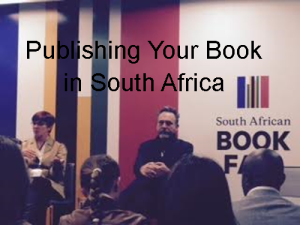 There were a wide variety of interesting workshops at the SA Book Fair, and lots of fun for kids too. (You can read about the fun we had with Nicky at two of the workshops Hugless Dougless and Dem Bones, on my blog One Step at a Time). I thought, however, that there may be many bloggers out there who want to turn their blogs into books, or who may have a book sitting on their computer (like me) who just need to take that next step to get going and publish it. Publishing your book in South Africa can go the traditional or the self-publishing route, and I learnt a bit about using traditional publishers at a workshop on Friday.
There were a wide variety of interesting workshops at the SA Book Fair, and lots of fun for kids too. (You can read about the fun we had with Nicky at two of the workshops Hugless Dougless and Dem Bones, on my blog One Step at a Time). I thought, however, that there may be many bloggers out there who want to turn their blogs into books, or who may have a book sitting on their computer (like me) who just need to take that next step to get going and publish it. Publishing your book in South Africa can go the traditional or the self-publishing route, and I learnt a bit about using traditional publishers at a workshop on Friday.
The workshop was led by author Mark Winkler , the author of two books at publishing house Kwela, and Louise Grantham, from publishers Bookstorm.
Louise was pretty repetitive: you have to think in terms of creating a product that people will buy, that is saleable. Are people going to buy this book?
She says that SA has a good non-fiction market BUT in order to write non-fiction you have to make a name for yourself first in your chosen field. An unrecognisable name is not going to sell in this genre.
The other important thing is that you should do a proper investigation of what market or niche the publisher you apply to sells. Louise says she receives lots of fiction when she only publishes non-fiction. Some publishers specialise in educational materials, others kid’s books. Try and find a similar author to your niche and go for that publisher.
Another interesting thing she said, where SA differs from overseas, is that overseas you need an agent, whereas here the publisher takes most of that role on.
Louise said that traditional publishing is better than self because you may be able to publish your book easily, but not sell it much. They have the creative team that knows how to package a book, give it the right cover etc.
Mark had some tips as well:
-The “Hygiene Factor”: when submitting your manuscript, make sure you follow the publisher’s guidelines. Make sure your spelling and grammar is perfect. Single page, double spaced, unbound paper in elastic.
-You have to have a good narrative / style/ point of view / voice / something that makes you unique.
-He suggests letting your book rest for 2-3 months after you’ve written it so that you can go back to it all fresh to edit it again.
-He says it works out more cost effective to go the traditional publishing route because according to him you may as well take out a second mortgage on your house to cover costs of self publishing.
The problem with traditional publishing, of course, is that it is hard to get accepted. This is where self-publishing can be an option if you want to put yourself out there.
Unfortunately, due to circumstances beyond my control, I was unable to attend the self-publishing workshop. But I know there is a lot of material about this on the internet. One example would be Create Space on Amazon. (Lia Marus did, her post is here).
The point they both concluded with at the end is that whichever route you take, make sure that you have professional expertise helping you every step of the way: that way you can better ensure success.



ja you don’t have to be famous for fiction, apparently. Just have to compete with the entire English speaking world!
You busy bee. I literally didn’t know which link to click because they are all sooo up my alley.
Interesting read. I have always thought one day I will write a book. I fictional one. Better get famous first then LOL